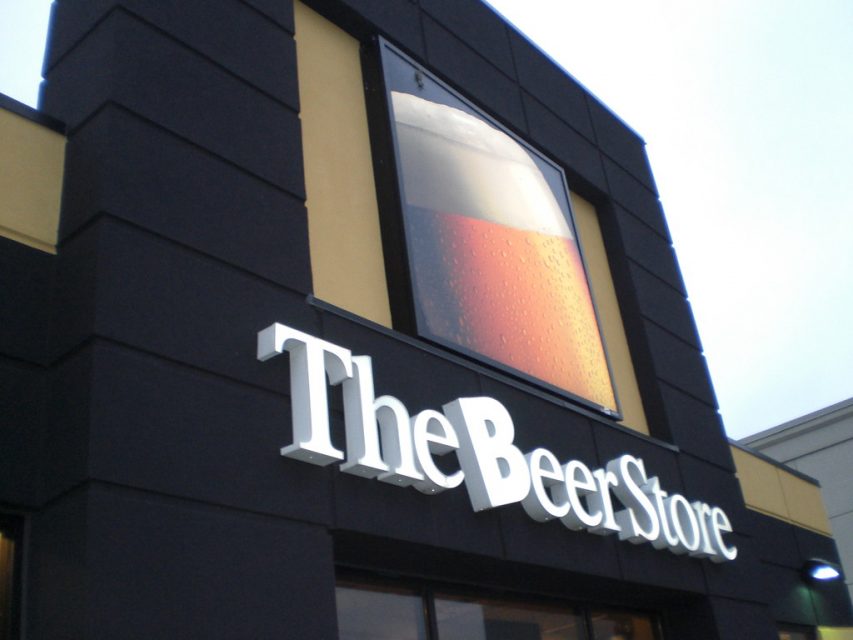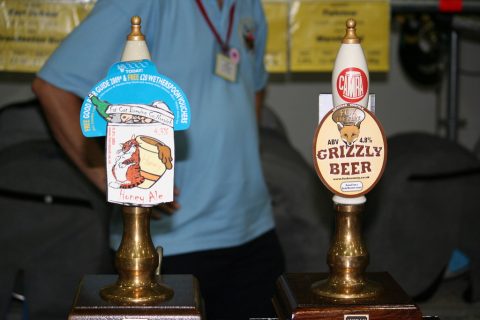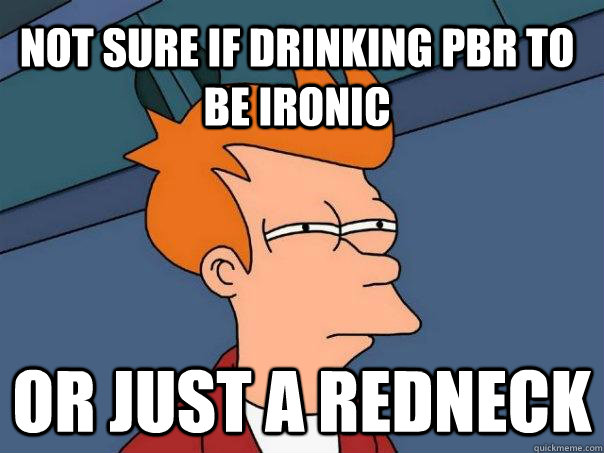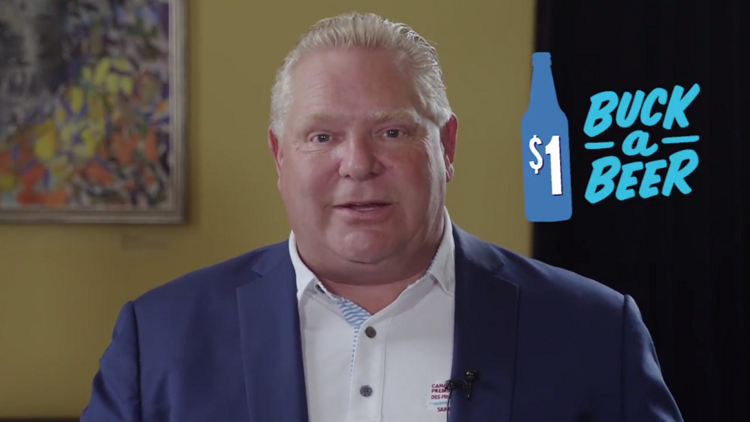I absolutely reject all the arguments of increased insurance liability and potential legal problems created by booze — I have no interest in the blatherings of insurance types and lawyers, because they’ve caused most of our Nanny-related problems anyway. The problems occur not with booze itself, but with the lack of personal restraint. And that’s something which is addressed by people acting like adults, not like children let loose in a candy store with $1,000 to spend.
Here’s part of the booze problem we face Over Here.
American beer is too weak, and American short drinks are served too strong.
The problem with weak beer is not its weakness per se, but the fact that you have to drink quite a bit of it to get a decent buzz — and the problem with drinking in quantity is that it’s really difficult to know when to stop once the old Alcohol Accelerator comes into play. I’d rather have a pint of Boddington’s Ale than four Michelobs (which are about equal in terms of buzz generation). The difference is that the former is, well, a pint; the latter is three pints. That’s a lot of liquid to drink, in a lunch hour, which means you have to drink it fast; whereas the Brit pint can be savored in a leisurely fashion, knowing that the destination will be the same.
Kim du Toit, “Un-Lubricated”, Kim du Toit – Daily Rant, 2005-02-24.
December 8, 2020
QotD: Booze
August 6, 2020
QotD: Selling booze to the immature
I’m getting really sick of manufacturers trying to extend their user base by appealing to younger people, playing on their unsophisticated and undeveloped taste buds by adding Kool-Aid flavors to grownup drinks. (Chocolate vodka? are you fucking kidding me?) This is akin to trying to get more women to shoot guns by making gunpowder smell like lilacs.
I am, by the way, fully aware of how innovation works — that most of civilization has occurred because someone, somewhere said: “Y’know, I bet if we just changed …” — but that’s confusing improvement with extension. Tinned fruity-flavored gin is not an improvement.
I know that raspberry-flavored beer may have caused more people to take to beer drinking, but that’s changed things, and not for the better. Go into any bar and look at what beers are on tap these days. Barely a drinkable one available, and worse, they’ve pushed all the decent beers into bottles (or out of stock) while hipsters and chickies are catered to with the latest fad, Strawberry IPA [pause to be sick].
Basically, booze manufacturers are changing their products to appeal to people who don’t like booze. In the old days of marketing, we used to call that pointless endeavor “catching eels” (try catching an eel in mid-air when someone tosses it in your direction and you’ll see what I’m talking about). Not only is it pointless, it’s mercurial because what’s popular today won’t be popular tomorrow as your fickle new customers chase after the next “Flavor Of The Month”, and you’ll have gone from catching one eel to catching multiple eels. That’s something they don’t teach in the Marketing section of the typical MBA course because MBAs are all about theory (“line extension”, “product enhancement”, etc.). And don’t tell me I’m talking nonsense because I’ve seen the curricula.
Kim du Toit, “Gilding the Lily #268”, Splendid Isolation, 2018-05-24.
March 29, 2020
Can we keep a few of these innovations after the Wuhan Coronavirus outbreak is over?
Chris Selley finds a few of the changes to business practice in Ontario to be definite improvements that we should retain once the panic subsides:

“The Beer Store” by Like_the_Grand_Canyon is licensed under CC BY-NC 2.0
Prepping my urban coronavirus hermitage involved packing my freezer with comforting made-ahead delights: pulled pork, chili, various pasta sauces including a life-altering Bolognese ragout recipe from Marie in Quebec City, who runs foodnouveau.com. Mostly, however, I’ve found myself wanting to eat … a bit more downscale. Supplies of Pogos and Bagel Bites are shamefully depleted, well ahead of schedule. And I do love that chicken from Popeye’s.
My superb local fried chicken joint has come up with a very simple and reassuring way to fill walk-up orders. It’s explained on the locked door: You phone in your order from outside, then retreat eight feet; an employee comes to the door with the credit/debit machine, makes eye contact, demonstratively puts on a fresh pair of gloves, opens the door and places the machine on a stool outside, along with the box of gloves. The customer dons a pair of the gloves, completes the transaction, discards the gloves in the waste basket provided, and retreats eight feet again. The employee, wearing fresh gloves, returns with the order and places it, with a smile, on the stool.
This is neither particularly ingenious nor unique. The food-delivery industry has taken to calling it “contactless delivery,” which is an amusingly jargon-y term for “pay in advance and we’ll leave it wherever you tell us and run.” I found myself weirdly impressed, though. Popeye’s system might not scale to Ronald’s place across the street, and I’m certainly not questioning McDo’s decision to shut down everything in Canada except delivery and drive-through. But especially living in a city where most everyone seems to be treating COVID-19 with suitable respect, it’s nice to appreciate the ingenuity that will keep those of us lucky enough to be sentenced to house arrest as comfortable as possible.
And it has been striking to see governments getting out of the way. Ontario, where change is generally about as welcome as a dry cough and fever, is all of a sudden a jurisdiction where licensed foodservice establishments can sell alcoholic beverages with takeout or delivery meals. It’s a place where supermarkets licensed to sell booze can do so as of 7 a.m. British Columbia made the same call on booze delivery and takeout. Alberta has allowed restaurants to sell their booze, period.
It’s hard not to notice that these loosened restrictions come as government-run bottle shops in Ontario and Quebec shorten hours. In Ontario, the Beer Store, a foreign-owned quasi-monopoly, has reduced hours and refuses to refund empty bottles. (There is no other place to refund empty bottles in Ontario.) They say you find out in a crisis who your friends are.
blogTO shows how some Toronto restaurants are getting creative with wine and food delivery options.
December 30, 2019
QotD: Microbrew beer
Hops, of course, add the bitterness we have come to expect in beer (except drinkers of Molson Golden, who have come to expect almost no taste at all), and they also act as a preservative.
Risk-taking microbreweries these days are known to replace or supplement hops with such oddities as heather, bog myrtle, ginseng, and hemp. As hops are related (by marriage) to cannabis — that other great medicinal herb — we shouldn’t be surprised to encounter hemp beer, and indeed you can usually find it on tap in Toronto at C’est What down on Front Street. It’s not bad either, once you get it lit, which is the hard part.
Nicholas Pashley, Notes on a Beermat: Drinking and Why It’s Necessary, 2001.
December 20, 2019
QotD: Ontario pubs
Bread, of course, led to variations like cake — which was good — and the kaiser bun, that tasteless, doughy piece of stodge named as revenge upon the Germans for WWI and served in many pubs to this day to diminish the pleasure of an honest hamburger. (The kaiser bun is mandatory in Ontario bars as a pivotal part of the legislation aimed at curtailing pleasure among the citizenry. Citizens who became accustomed to pleasure might start to see it as their due, which would be inconvenient for the authorities.)
Nicholas Pashley, Notes on a Beermat: Drinking and Why It’s Necessary, 2001.
August 8, 2019
An excellent illustration of market segmentation
The Wikipedia entry for “market segmentation” defines it this way:

“BEER”by Jonnee is licensed under CC BY-NC-SA 2.0
Market segmentation is the activity of dividing a broad consumer or business market, normally consisting of existing and potential customers, into sub-groups of consumers (known as segments) based on some type of shared characteristics. In dividing or segmenting markets, researchers typically look for common characteristics such as shared needs, common interests, similar lifestyles or even similar demographic profiles.
No single product is going to be universally popular, and it’s generally a bad idea to present it that way. The producers of a new product ideally try to identify the groups of potential customers who are more likely to want to buy the new product, and tailor their advertising to those groups. The more accurately they can identify and communicate with these customer groups, the greater the chances that the product will be a success in the market.
Beer isn’t universally popular (Gasp! Shock! Horror!), so brewers try to identify different kinds of beer drinkers and market their brews to those sub-groups:
The point about a market being that you can put your stuff out there and see who buys it. The buyers will – they are rational beings after all – select from the varied offerings and their selections will be the ones which best increase their utility by their own measurements of that utility. Thus the Shagmenowbigboypint might get a bit more business toward closing time, who knows? Not necessarily entirely female business either.
And even to stop being puerile about it. We’ve only this one system that does provide multiple choices – that’s what a market is. But in order for ever finer meeting of utility it’s necessary for ever finer slices of the market to be addressed. That is, we need to have free market entry so we can find out what it is that actually meets peoples’ desires.
Banning something that appeals to some slice of that market is thus defeating the point and object of that very market’s existence. Sure, lots of women won’t buy a sexist beer. Some will, as will some men. The aim and art of the whole exercise being to allow those who won’t not to, those who will to.
Or, as we can put it, every beer being Shagmenowbigboypint is as bad as no beer being Shagmenowbigboypint.
December 13, 2018
When Democrats Loved Deregulation
ReasonTV
Published on 12 Dec 2018Left-leaning politicians of the 1970s understood that red tape punishes consumers and protects big business. The leading deregulator of that era was none other than Jimmy Carter.
————————
Follow us on Twitter: https://twitter.com/reasonReason is the planet’s leading source of news, politics, and culture from a libertarian perspective. Go to reason.com for a point of view you won’t get from legacy media and old left-right opinion magazines.
————————
When President Donald Trump bragged in his first State of the Union address about cutting red tape, the Democratic response was no surprise. “Deregulation,” warned Center for American Progress Senior Advisor Sam Berger in Fortune, “is simply a code word for letting big businesses cut corners at everyone else’s expense.”But many leading Democrats had the opposite view in the 1970s. Then, at the dawn of the deregulation era, left-leaning politicians and economists understood that excessive government management of industry let the big-business incumbents get away with lousy performance at the expense of competitors, taxpayers, and consumers. The leading figure in that fight to cut red tape and shut down entire federal agencies was none other than Jimmy Carter.
It was Sen. Ted Kennedy who held extensive Senate hearings in the early ’70s, with testimony from the likes of Ralph Nader and liberal economist Alfred Kahn, about the benefits of lifting state controls on the airline industry. The resulting Airline Deregulation Act of 1978, signed by Carter, killed the Civil Aeronautics Board — a federal agency that decided which airlines could fly where, and even what they could charge. The new competition to the old airline cartel reduced fares, expanded destinations, increased safety, and made air travel an option for those of us who aren’t rich.
Carter also lifted stifling government oversight of the rail and trucking industries under a Democrat-controlled House and Senate. The result? Competition intensified, prices dropped, and consumers saved more money on everyday products.
In 1978, President Carter signed a bill that lifted Prohibition-era criminal restrictions on home brewing. The legalization of do-it-yourself beer production unleashed a boom of experimentation, paving the way for the craft beer revolution that is ongoing to this day. The year that Carter loosened the rules, the U.S. was home to a mere 50 breweries. Today there are well over 5,000. In two generations of beermaking, America went from global laughingstock to world leader.
The governor of California during Carter’s presidency was none other than Jerry Brown, then known as “Governor Moonbeam” for his far-out musings, glittery social life, and lefty politics. Yet Brown, too, could be a fiery skeptic of government. In his terrific second inaugural address in 1979, Brown stated that “many regulations primarily protect the past, prop up privilege or prevent sensible economic choices.”
But even while some sectors were unleashed four decades ago by far-seeing Democrats and Republicans alike, too many governments at the local, state, and federal levels have forgotten those lessons, and instead imposed entirely new categories of regulations. Occupational licensing, which applied to about one in 10 jobs 40 years ago, now impacts one in three.
So how did the party of Jimmy Carter and sideburns-era Jerry Brown become the ideological home of Elizabeth Warren and Alexandria Ocasio-Cortez? One explanation may be that Democratic support for deregulation back then was born out of a sense of nearly hopeless desperation in the face of stagflation. Cutting red tape to foster dynamism was about the last move politicians had left.
Our long economic expansion and stock-market boom will soon come to an end, imposing limits on government precisely at the moment when it’s asked to do more. When that day of reckoning comes, the best questions for lawmakers of both parties to ask may just be: What would Jimmy Carter do?
Photo credits: Jimmy Carter Library, Arthur Grace/ZUMA Press/Newscom, Dennis Brack/Newscom, Everett Collection/Newscom, Ron Sachs/CNP/MEGA/Newscom, Brian F. Alpert/ZUMA Press/Newscom, Paul Harris/Pacific Coast Nes/Newscom, Bee Staff Photo/ZUMA Press/Newscom, Dennis Brack/bb51/Newscom, Jonathan Bachman/REUTERS/Newscom, Rick Friedman/Polaris/Newscom
November 20, 2018
QotD: Why do we drink?
Alcoholic beverages, like agriculture, were invented independently many different times, likely on every continent save Antarctica. Over the millennia nearly every plant with some sugar or starch has been pressed into service for fermentation: agave and apples, birch tree sap and bananas, cocoa and cassavas, corn and cacti, molle berries, rice, sweet potatoes, peach palms, pineapples, pumpkins, persimmons, and wild grapes. As if to prove that the desire for alcohol knows no bounds, the nomads of Central Asia make up for the lack of fruit and grain on their steppes by fermenting horse milk. The result, koumiss, is a tangy drink with the alcohol content of a weak beer.
Alcohol may afford psychic pleasures and spiritual insight, but that’s not enough to explain its universality in the ancient world. People drank the stuff for the same reason primates ate fermented fruit: because it was good for them. Yeasts produce ethanol as a form of chemical warfare — it’s toxic to other microbes that compete with them for sugar inside a fruit. That antimicrobial effect benefits the drinker. It explains why beer, wine, and other fermented beverages were, at least until the rise of modern sanitation, often healthier to drink than water.
What’s more, in fermenting sugar, yeasts make more than ethanol. They produce all kinds of nutrients, including such B vitamins as folic acid, niacin, thiamine, and riboflavin. Those nutrients would have been more present in ancient brews than in our modern filtered and pasteurized varieties. In the ancient Near East at least, beer was a sort of enriched liquid bread, providing calories, hydration, and essential vitamins.
[…]
Indirectly, we may have the nutritional benefits of beer to thank for the invention of writing, and some of the world’s earliest cities — for the dawn of history, in other words. Adelheid Otto, an archaeologist at Ludwig-Maximilians University in Munich who co-directs excavations at Tall Bazi, thinks the nutrients that fermenting added to early grain made Mesopotamian civilization viable, providing basic vitamins missing from what was otherwise a depressingly bad diet. “They had bread and barley porridge, plus maybe some meat at feasts. Nutrition was very bad,” she says. “But as soon as you have beer, you have everything you need to develop really well. I’m convinced this is why the first high culture arose in the Near East.”
Andrew Curry, “Our 9,000-Year Love Affair With Booze”, National Geographic, 2017-02.
November 18, 2018
Ironically, Pabst may be forced to start brewing its own beers
I’ve never had a PBR, so maybe all those hipster poseurs really do like the stuff, but their favourite ironic drink may be in danger, as Pabst is suing MillerCoors to force them to keep brewing the stuff for Pabst:
A Wisconsin courtroom was the setting this week for a lawsuit pitting some of the biggest names in watery American beer against each other. The case pits “hipster favorite” Pabst, parent of PBR, against the much larger MillerCoors, which Pabst claims wants “to put it out of business.”
Earlier this year, Pabst sued MillerCoors, alleging MillerCoors has engaged in “breach of contract, breach of anti-competition laws, fraud, and misrepresentation.” The companies’ currently have an agreement in which MillerCoors brews Pabst’s beer brands. That agreement is about to end, and MillerCoors seems ambivalent about renewing the contract. Pabst has asked the Wisconsin court to award it $400 million in damages and to force MillerCoors to renew the contract.
The case, which is being heard in state court in Milwaukee, could decide the future of Pabst’s entire portfolio of beers, from PBR to Old Milwaukee, Lone Star, Old Style, Colt 45, Natty Bo, Rainier, Schlitz, Olympia, Stroh’s, Schaefer, Schmidt’s, Pearl, and Blatz.
MillerCoors brews Pabst’s beers under a 1999 contract—a type of agreement known in the industry as contract brewing—that is set to expire in 2020. That contract contemplated two potential five-year renewals. MillerCoors argues the company should be free to determine whether to renew the contract, while Pabst alleges “that the two need to find a solution together if Pabst wants to continue the agreement.” Pabst also insists MillerCoors has a good-faith obligation to negotiate a renewal.
MillerCoors hasn’t foreclosed on continuing its partnership with Pabst. For example, it’s considered selling its Irwindale, California, facility to Pabst, or continuing to brew Pabst’s beers there at a much higher cost.
Pabst insists the only way the company can continue to exist is if MillerCoors, which is owned by Molson Coors, continues to produce its beers under contract at a cost Pabst finds fair. That may be true. Pabst doesn’t brew beer, and AB InBev, which owns industry leader Budweiser and which is likely the only other brewer large enough to produce the full Pabst line, forswears the contract-brewing model.
As Tim Worstall put it earlier this week: “Basically, and not accurately, Pabst books the advertising space and MillerCoors does everything else. And given that it’s the brand bit of brewing that makes the money, not the brewing bit, why would you continue such an arrangement if you didn’t have to?”
As Iowahawk put it, “Oh cripes when will I ever learn not to trigger the Beer Snobs”:
October 20, 2018
Barley, beer, and climate change
There was a “study” recently released proclaiming the end of beer … or at least a huge hike in beer prices coupled with a drop in availability due to climate change. Tim Worstall explains why the report is — at best — misleading:

Barley (Hordeum vulgare) at the United States National Arboretum.
Photo by Flikr user “Cliff” via Wikimedia Commons.
You’ll have seen the various reports over the past few days that climate change is going to do terrible damage to the beer industry. The mechanism is that drought and heat will reduce the barley yield, this will then reduce the amount of beer that can be made. What follows is the explanation from the actual researchers of what they’ve done. It is, to put it mildly, nonsense. For their assumptions are wrong. Let us say that climate change does reduce barley yields on those lands currently planted to it. But we do know that as this happens then other, more polar, regions open up to being suitable for the growing of barley. So the initial worry is just untrue.
They then go on to insist that we’ll feed the cows on the barley that’s left rather than make beer from it. Thus the shortfall in beer is greater than that in barley. Nonsense upon stilts. Humans don’t work that way. We started this agriculture thing because we wanted the beer after all. Feeding the animals came later – and often enough the cows are fed on the barley after we’ve made the beer from it anyway. We’d put our minimal supply into booze not beasts.
Finally, they tells us that Irish beer prices would double. No, really, given the level of taxes there upon the stuff it’s really not true that even their 30% reduction in barley supply is going to double the price.
September 28, 2018
QotD: “Lite” beers
Then there was the fellow who sent an unlabelled jar of Bud Lite to a laboratory for analysis. A week later he received their report: ‘Dear Sir, we regret to inform you that your horse has diabetes’.
David Warren, “On beer consumption”, Essays in Idleness, 2018-09-07.
August 31, 2018
Farewell, buck-a-beer publicity stunt, we hardly knew ye
Chris Selley on the all-too-brief publicity stunt of cheaper beer for Ontario:
President’s Choice is ending its buck-a-beer promotion on Sept. 3, just days after it started: We get one week, one long weekend and then out of the pool, party’s over, back to class. PC-branded beer will rocket back up to $1.38 a bottle when you buy 24 at The Beer Store or $1.65 when you buy 12, which highlights just how steep — and presumably unsustainable — the discount really was. We shall see how long the two other participating breweries’ offers last, but they made it quite clear, as did PC, that this was a limited-time offer prompted by Doug Ford’s most shamelessly blunt populist pledge.
My goodness, though, what a commotion it will leave in its wake. Some brewers quite understandably took the opportunity to note the impact of aluminum tariffs on their bottom lines, to complain that Ford’s government was playing favourites by giving away expensive product placement in LCBO stores for $1 beer, and to note the government is actually raising taxes on beer.
Others, however, waxed utterly scandalized. “How about buck a pound of steak? Who would eat that?” asked one Toronto brewer who had perhaps not entirely thought through his rhetorical question. “We haven’t even given two thoughts about this,” Great Lakes Brewery’s communications manager, Troy Burtch, told the Toronto Star. “Why would anyone do this?” Burtch and Great Lakes have signalled their total uninterest by tweeting incessantly about it.
The Canadian Taxpayers’ Federation went after some of the affronted craft brewers for accepting taxpayer subsidies for their higher-end products. People on social media lined up for and against buck-a-beer, vowing to boycott the participants or those complaining about the program.
The whole thing was a dumb Ford Nation stunt, no question. But good grief. You can hardly blame the breweries, either for participating or for not: they were just trying to wring as much publicity as they could from the situation. No one is really any worse off, or at least not much. What we were really seeing among the chattering classes was a rerun-by-proxy of the June 6 election: to drink Ford’s swill was to vote Ford Nation; to boycott it was to stand bravely against their entire agenda.
June 23, 2018
QotD: The protectionist two-step, Alberta craft-beer variant
Economic protectionism has two classic rationales. Sometimes, as in the case of Alberta’s clumsy attempt at an interprovincial tariff on craft beer, it is undertaken in the name of defending small, emerging “infant industries” that a government wishes to give time to establish themselves in its territory. And sometimes, as in the case of Canadian dairy supply management, it is done to defend “strategic” industries that have existed forever and that allegedly create an irreplaceable quantity of employment and profits.
Give yourself a gold star if you spotted that these canonical pretexts for trade barriers are contradictory. The inherent promise of protection for “infant industries” is that they will grow up and leave the nest. But, oops: by the time they reach adulthood, they may have become too “strategic” to expose to market forces. Heads, the favoured firms win; tails, the consumer loses.
Of course, on the level of fine detail, the arguments for trade barriers are manifold and complicated. (If you get into a quarrel about dairy, and take the free-trade side, you will find them being changed by your interlocutor every 30 seconds.) Alberta’s program for supporting small brewers has an unclear, touchy-feely small-is-beautiful justification. By design, the tariff applies only to businesses that have no intention of attaining industrial scale. It’s right there in the term “craft brewing,” isn’t it? Whatever the esthetic merits of craft beer, this is surely the deliberate encouragement of what the urbane left likes to calls “precarious” jobs that could be flung into disarray by a bad season, a shift in fashions, or a supply problem.
And, also, it’s illegal.
Colby Cosh, “A court refuses to swallow Alberta’s thinly disguised craft-beer tariff”, National Post, 2018-06-22.
December 17, 2017
Beer Brewing – Roger Casement – Surviving Aces I OUT OF THE TRENCHES
The Great War
Published on 16 Dec 2017Ask your questions here: http://outofthetrenches.thegreatwar.tv
November 3, 2017
Why Does American Beer Taste Like Water?
The Good Stuff
Published on 29 Jun 2016Americans drink 51 Billion Pints of beer every single year. Despite the abundance of craft beers available, the most popular variety is the traditional light American Lager. But why do these mass produced beers taste so watery? And how did they get to be so popular in the first place?
Special Thanks To:
Ray Daniels, and the Cicerone Certification Program
https://www.cicerone.org/





